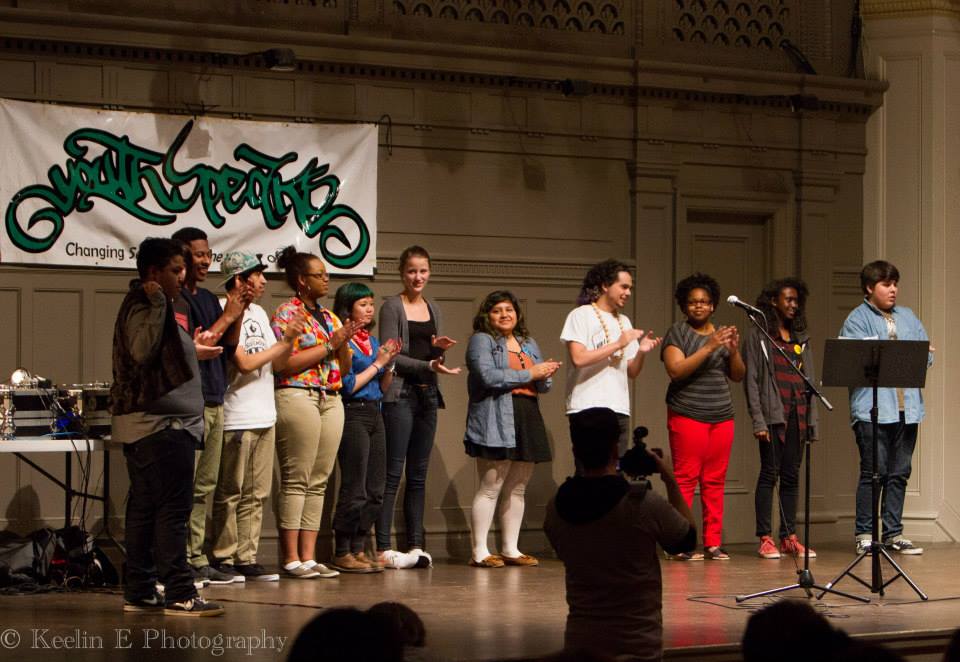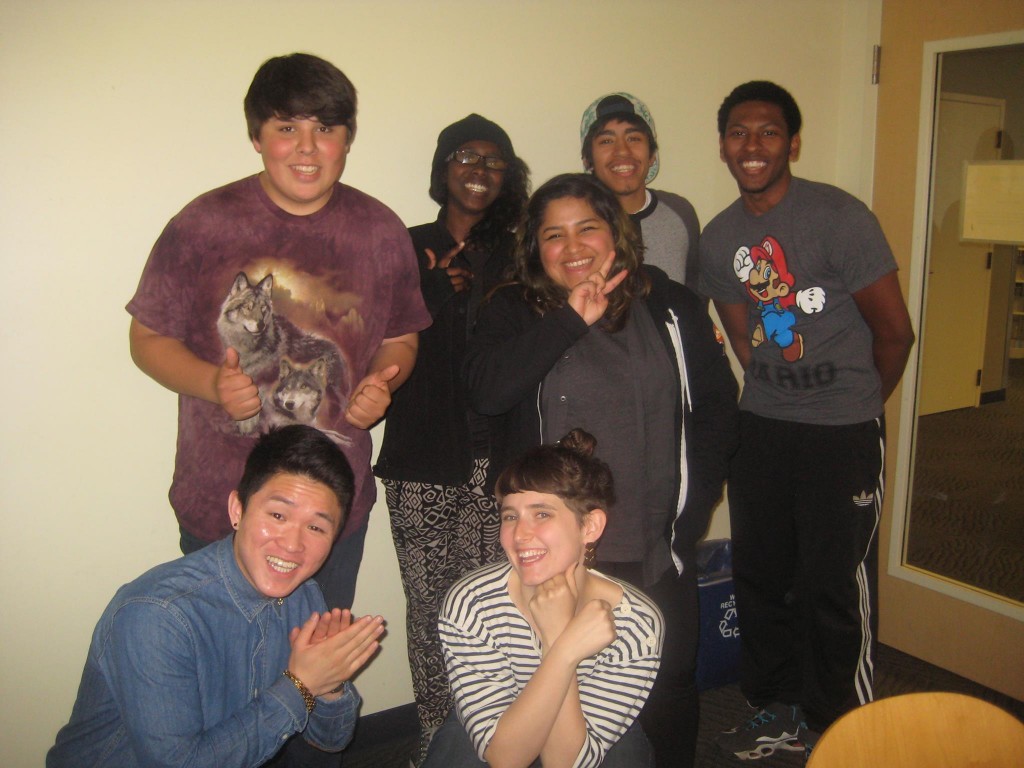Spirit of the Slam: How Our Community Agreements Shape the Competition
If you weren’t there or didn’t hear about it through our many Twitter hashtags, I want to tell you that the 2014 Youth Speaks Seattle Grand Slam was an explosively tremendous night. Poetry and community intersected between the stage and the bursting pews of Town Hall Seattle. Fierce young poets from across the greater Seattle area graced the mic with their realest truths, let loose, raw and whole through their throats. From carpets to ceiling, there seemed to be a collective agreement to be present and in appreciation of all the stories shared.
To me, the Youth Speaks Seattle Slam Series is a prime example of how a community can honor a competition and loving interconnectedness at the same time. This is not to say that it’s an easy tension to navigate. At a local and national level, the Youth Poetry Slam Movement is constantly discussing how we can hold the gimmick of this game called slam within the sacred space of community. At Brave New Voices (the international youth poetry slam festival), there is ongoing negotiation on how to handle and discuss the scores. At most slams, you can hear the audience, yell “Screw the scores!” or chant in unison, “The point is not the points, the point is the poetry!”. It’s even written in to the slam spiel and history repeated at most poetry slams across the country: The founder of poetry slam, a construction worker named Marc Smith, wanted to give poetry back to the people so he made it into a game. As a slammer of 8+ years, I have explained to countless new participants, “Scoring is our way to trick people into coming a poetry event. And you’re here, aren’t you?”
As a young person, I was more clumsy poet than athletic jock. Slam was a way for me to honor competition and magical team experiences without struggling through sprints. And yet, many believe putting numbers on people’s experiences is running in the opposite direction of community. How do we hold both? Competition can be respectful, fun, motivating and EPIC. It can also prove to be poisonous to an authentic and supportive community if not handled with care. I believe that community must carry it with what some call “the spirit of the slam”. That spirit is one that holds each voice as visible, valuable and a catalyst for shifting culture. While we agree to a scoring system, we also agree to recognize the truth and agency of all voices on the mic. Our experiences cannot be quantified. We agree that we are powerful. Our truths in all their complexity and depth are powerful. Indeed, naming these collective pacts might be key to creating a space where we can make them a reality.
A huge lesson from my first year at Arts Corps and Youth Speaks Seattle was around the importance of creating a set of community agreements. It’s a regular practice of Arts Corps teaching artists to establish community agreements when they are working with a group of young folks. I’ve gotten in the habit of having it be nearly the first thing on the agenda, after learning names and gender pronouns. Teaching artists have different approaches to facilitating the creation of agreements. Ranging from paper snowball fights (where students write their needs in a supportive creative space and throw them across the room to be shared by a peer anonymously) to interviewing in pairs on their requests for the classroom, teaching artists find ways to ask every youth to contribute their voice into how the space will operate.
Whatever way it’s discussed, the creation of community agreements is a special opportunity. It’s a place where young folks get a say in how they get to show up to a space. We live in a world where interlocking oppressions often dictate the “rules”. Creating agreements is a way to pushback against these norms. While obviously adultism, racism, sexism and all ‘isms still exist in our communities and classrooms, community agreements are one way to recognize and challenge them. Agreements can range from “Be respectful” and “Honor all voices” to “Oppressive dynamics will be challenged” and “Take Space, Make Space”. In the magical and intense context of poetry slam, these types of agreements are essential.
Holding all these tensions, one of the first acts that the 2014 Youth Speaks Seattle Slam Team did together was a creation of community agreements and goals for our team experience. The team of five poets (Carlos Nieto, Evelyn Fitz, Deqa Mumin, Travis Thompson and Koha Farr) and two coaches, YSS mentor Troy Osaki and myself, talked through the balance of competition and community. We looked at the amazing legacy that the Seattle team has for always giving love to all poets who share their work at BNV. All this in mind, some of the agreements we created were:
- Show Love.
- Safe & Brave Space.
- Do Our Best!
- Rep Seattle! Be Proud!
- Be Audience Members AND poets!
- Believe in our stories, voices and values!
We continue to revisit these agreements as BNV grows closer. On July 15th, we’ll take off for Philly to connect and compete with teams from all over the country and the world. We know that the scores we’ll receive have value, but they don’t outweigh the friendships we’ll cultivate, the vulnerability we’ll share and certainly not the movement we are helping to build.
– Shelby
Youth Speaks Seattle & Teen Artist Program AmeriCorps
—
To receive updates from the Youth Speaks Seattle team while they compete at BNV, follow us on Twitter: https://twitter.com/youthspeaks206
And look out for some BNV vlogs on our Facebook page: https://www.facebook.com/youthspeaks206


